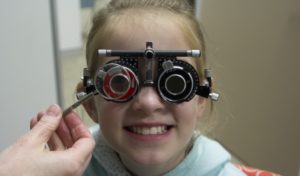Some Known Questions About Eye Exam.
Table of ContentsAmblyopia Fundamentals ExplainedFacts About Adult & Paediatric Eye Surgery UncoveredThe Single Strategy To Use For Adult CataractGetting The Adult Strabismus To Work
Ophthalmologists are clinical doctors that specialize in the diagnosis and also treatment of eye and also vision problems. What is the distinction in between an ophthalmologist as well as an optometrist, after that? What about lens? These 3 sorts of eye treatment specialists have instead similar-sounding names and also overlapping task summaries. It can be confusing in the beginning glance.They can not offer eye tests, compose prescriptions, or detect or treat eye issues. Provide eye tests, vision testing, and also prescriptions for glasses or get in touch with lenses.

Eye doctors identify and also deal with injuries, infections, conditions, and disorders of the eye. Treatments can consist of medicine taken by mouth (by mouth) or topically (in the eye), surgery, cryotherapy (freeze therapy), as well as chemotherapy (chemical therapy). Ophthalmologists participate in clinical college after that get a number of years of specialty training in the clinical and also surgical care of the eye.
A Biased View of Eye Exam
As they are the only clinical experts that can deal with all eye disorders, eye doctors see a wide array of eye problems, including: Exactly how frequently should you have an eye exam? What are signs that show you may have an eye issue that requires to be checked by an ophthalmologist? The American Academy of Ophthalmology recommends: As children's eyes are expanding and altering quickly, they ought to get a vision testing.
Grownups who have healthy eyes as well as superb vision should have four thorough eye exams: one in their 20s, 2 in their 30s, as well as one at age 40. These examinations may enable the eye doctor to catch an eye condition or vision changes at an early stage. By the time you discover signs and symptoms, you might already have some vision loss (PAEDIATRIC OPHTHALMOLOGY).

People who are at a higher danger of eye condition may require to get an eye examination regularly. This can include individuals with diabetes, hypertension, or a family members background of eye issues - ADULT CATARACT. After age 65, your eyes need to be checked each to 2 years. Despite age, people that put on contacts must have a complete eye test each year.
Your view depends upon seeing the ideal ophthalmologist at the correct time. When it's time to "get your eyes inspected," make sure you are seeing the best eye treatment expert for your requirements. Eye doctors, eye doctors and also opticians each play a vital role in supplying eye treatment to consumers. But the degrees of training and proficiency are fairly different for each and every kind of supplier.
Unknown Facts About Adult Cataract

is a clinical or osteopathic doctor that concentrates on eye and also vision care. Ophthalmologists differ from optometrists and opticians in their degrees of training and also in what they can identify as well as treat (https://anotepad.com/notes/nrkkbsbg). As a medical doctor who has actually completed university and also a minimum of eight years of added clinical training, an ophthalmologist is licensed to practice medicine as well as surgery.
Many ophthalmologists are likewise included in clinical research study on the reasons and also treatments for eye illness and vision problems. SUBSPECIALISTS: ADDED EXPERTISE AND ALSO TRAINING FOR CERTAIN EYE requires While ophthalmologists are trained to look after all eye troubles as well as conditions, some Eye M.D.s focus on a details area of medical or surgical eye treatment.
He or she generally finishes 1 or 2 years of added, more extensive training called a fellowship in among the primary subspecialty areas such as glaucoma, retina, cornea, pediatric medicines, neurology and also cosmetic surgery, along with others. This added training and expertise prepares an ophthalmologist take treatment of even more facility or details problems in specific locations of the eye or in certain teams of people.
An eye doctor is not a clinical doctor. An eye doctor receives a medical professional of optometry (OD) degree after completing four years of optometry school, come before by 3 years or even more years of college. They are certified to practice optometry, which largely entails carrying out eye examinations as well as vision examinations, recommending as well as dispensing restorative lenses, discovering certain straight from the source eye problems, as well as recommending medications for sure eye conditions.
6 Easy Facts About Adult Strabismus Described
They use prescriptions provided by eye doctors or optometrists, however do not test vision or write prescriptions for visual adjustment (https://drcrlinecatt.shutterfly.com/). Lens are not permitted to identify or deal with eye illness. AMBLYOPIA.
Having a household member with eye illness can make you more prone to having that condition also. Sight-stealing eye illness can appear at any kind of time. Very usually they are unnoticeable initially and are hard to discover. That's why it is so important to see an eye doctor for a complete clinical eye examination by age 40, and after that as usually as recommended by your Eye M.D.
If you have any of these, make sure to see an eye doctor. A full, medical eye exam by an Eye M.D. can be the primary step towards saving your sight. Bulging of one or both eyes; Dark drape or shroud that obstructs your vision; Decreased vision, even if temporary; Diabetic issues mellitus; Distorted vision; Dual vision; Excess tearing; Eyelid problems; Household history of eye condition; Halos (colored circle lights); Hypertension; HIV or Help; Injury to the eye; Loss of peripheral (side) vision; Misaligned eyes; New floaters (black "strings" or flecks in the vision) and/or flashes of light; Pain in the eye; Thyroid disease-related eye problems (Graves' illness); Uncommon red eye.